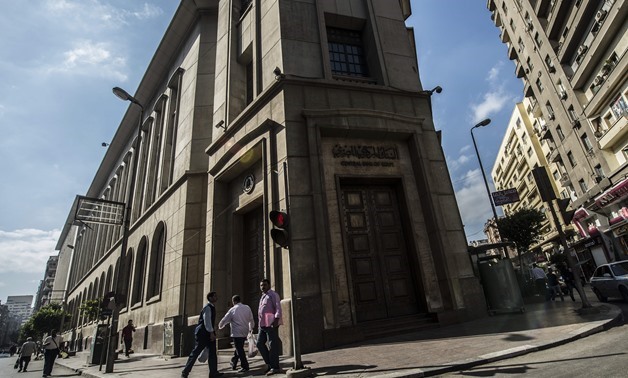
Central Bank of Egypt - File Photo
CAIRO – 9 July 2017: The Central Bank of Egypt’s (CBE) unexpected decision to hike key policy rates is “unjustifiable” and will add more pressure on the state budget with a potential LE 14 billion ($78.2 million) increase in the projected deficit, two investment banks forecast in Sunday reports.
In a surprise move, the CBE’s Monetary Policy Committee on Thursday raised the key policy rates by another 200bps for the second straight meeting, reversing analysts’ forecasts of keeping them on hold. The overnight deposit and lending rates went up from 16.75 to 18.75 percent and from 17.75 to 19.75 percent, respectively.
The CBE said its decision was driven by the recent fiscal consolidation measures, which included energy subsidies cut, full implementation of the value added tax (VAT), posing upside risks to the inflation outlook.
“Our main concern is the higher pressure on the fiscal front: We find the current monetary policy running counter to the announced fiscal reform program,” Mubasher International‘s Economist Esraa Ahmed said Sunday.
Citing interest payments’ increase, Mubahser revised its projection for FY2017/18 budget deficit, from LE 418 billion (10.1 percent of GDP) to around LE 431 billion (10.5 percent of GDP).
Pharos Holding’s Economist Ramy Oraby said it a Sunday report that such policy rate hike is expected to be “temporary”, before the CBE starts monetary easing by December 2017 as inflationary pressures decline.
“We expect the total budget expenditure to go up by LE 13 billion to reach LE 1.26 trillion FY2017/18. Accordingly, we raised our forecast of the budget deficit to 10.2 percent of GDP in FY2017/18,” Oraby added.
Pharos held its forecast of projected primary deficit, which excludes the interest payments, at 0.1 percent of GDP in FY2017/18. “More foreign inflows in the EGP-denominated treasuries will help minimize the negative impact of July’s 200bps nominal interest rate hike,” the report read.
The two increases in base rates this year were not taken into account in the state budget for the 2017/18 fiscal year, Deputy Finance Minister for Treasury, Mohamed Moeet, told Reuters Saturday. The budget was approved by the Parliament last week and has yet to be ratified by President Abdel Fatah al-Sisi.
The Government aims to slash the public debt to 95 percent in the state budget for FY2017/18 (which started July 1), while the budget deficit is targeted not to breach above 9.1 percent of GDP, down from around 12 predicted in FY2016/17.
Following May’s 200bps policy rate hike, the short-term treasury yield edged up from an average of 19.3 percent in April to 20.4 percent in June.
Limited impact on inflation
Egypt’s inflation has accelerated to the highest level in decade, averaging 30 YoY since November, on the back of the pound's flotation, VAT introduction and subsidy cuts, despite raising key interest rates by a total of 700bps.
All these measures were necessary for Cairo to clinch a $12 billion three-year loan agreement with the International Monetary Fund (IMF).
While the CBE defends his decision as a tool to curb this soaring inflation, analysts argue that it will a limited impact on containing a cost driven inflation triggered by higher production cost after the float along with other reforms, not an increase in demand.
“We stick to our view that recent interest rate hikes will hardly affect inflation as it is mainly cost driven. Higher rates on savings will not offset the inflationary impact of fuel subsidy cuts, electricity prices’ hike, and a higher VAT,” Mubasher’s Economist said.
She added that YoY inflation is projected to hit 35 percent on average in Q1 2017/18 (from July to September). Meanwhile, favorable base effect may be more effective in easing inflation rates afterwards.
Winners and losers
Due to a surge in yields on treasuries, Mubasher predicts more foreign investment (mostly hot money) inflow to the CBE auctions, especially in T-bills that are more liquid and offer highly attractive rates.
Yields on 182-day T-bills have almost doubled from 11.82 percent in February 2016 to 21.15 percent in July 2017 (before the latest rate hike), according to Mubasher report.
Household savers and cash-rich companies are seen as the big beneficiaries of the recent rate hike. Further, commercial banks can be key gainers if they managed to pass on a smaller portion of the policy rate hike onto deposit rates, Oraby stated.
On the other hand, the equity market is predicted to face some pressure on the short-term, but a positive report by the IMF to follow the anticipated disbursement of the second loan tranche is likely to absorb any potential negative shock of the policy rate hikes.

Comments
Leave a Comment